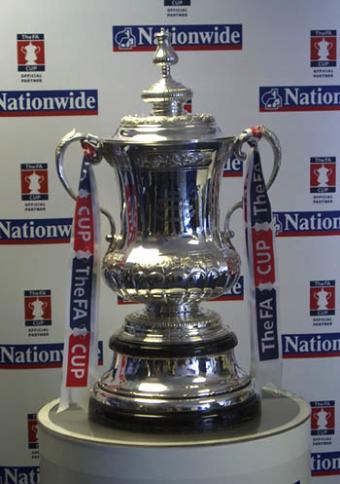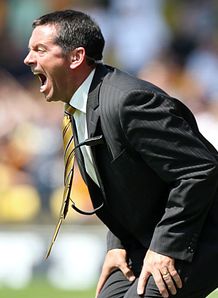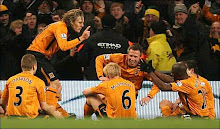
What an objectionable game of football this was. Appalling weather, to begin with. Pea soup is something even miracle workers like Phil Brown can do nothing about, however. The fog was as dense as the football, and provided only a partial excuse for the drab, guileless, limited and hilariously awful affair Stoke City and Hull City served up.
Stoke dominated the game, but their domination is based on one thing - that notorious Rory Delap long throw. It is a freakishly effective weapon, and purism can't deal with it, as Arsenal, Aston Villa and Everton have all discovered to their cost. Almost everything this team of uncultured enforcers did was designed to force the opposition into conceding a throw-in anywhere within their own half. Then Delap would get his grip right while the gangly, elbow-happy lummoxes all made their way towards the penalty spot.
Happily, City were prepared to accept this tactic and stifle it. This they did effectively, with Boaz Myhill never troubled by air-punches and only once needing to make an out-and-out save from a Delap howitzer. Stoke, for the rest of the time, were in control of the ball without really being in control of their destiny.
Brown finally dispensed with 'tradition' and jettisoned the 4-3-3 system which had been in operation, with largely the same personnel, since the win at Arsenal more than two months ago. In that time, only Ian Ashbee's one-match ban and Andy Dawson's recent Achilles trouble has prompted personnel alterations. But now a 4-2-2 was proffered, though it still only involved one actual teamsheet change - Daniel Cousin dropping to the bench and Nick Barmby replacing him, a little surprisingly, as a wide midfield option. Dawson was still crocked and so Sam Ricketts continued at left back. Otherwise it was the team to which we've all become accustomed.
Off we went then, with the Britannia Stadium still not made any more attractive by having a full and loud audience packed within. The gaps in the corners which allow freeloaders to watch the game from the grassbanks are unflattering within a stadium with as few redeeming features as it is possible to have; the disappearance of the electronic scoreboard providing extra space for non-payers to get a free gawp at Premier League football, albeit of a limited standard.
I'll keep this as brief and as painless as possible. Stoke had more chances, but City took the lead, then the long throws and reaction thereto became the mainspring of the game prior to a questionable equaliser and another stalemate.
Ricketts, who had an unconventionally dodgy game, lost the ball in the left back position, allowing a Stoke charge which saw Michael Turner half-clear the cross to Salif Diao, who belted his shot wide.
Barmby had City's first chance almost half an hour in when he got to the back post to head down Dean Marney's free kick, but missed the target. It seemed to hit a Stoke player on its way but a goal kick was given.
George Boateng then played Ricketts into trouble on his own byline and Stoke nicked possession. Ricardo Fuller had the final chance from the low cross but poked it wide. A let-off, and a big one at that.
The long throw had become Stoke's focal point already, but Delap had been offered few chances thanks to a mixture of heavy duty City clearances and a total unwillingness to find touch, even when in danger. Myhill, under pressure from a backpass, even preferred to concede a corner rather than a throw on the grounds that it would be less dangerous. Meanwhile, sub Dean Windass did some enthusiastic warming-up exercises right in front of Delap as he shaped his run-up, and the referee chose (rightly, to be honest) to give him a yellow card the second time it happened.
A board went up for added time and staring at a urinal seemed almost like a passable alternative to this drivel. But then Ricketts aims a long free kick, Turner and Marney both contribute headers and Marlon King turns and fires a fine shot into Thomas Sorensen's net with aplomb and style. A lead at the break from the first proper shot at goal. Excellent.

Second half. Still foggy. Still hard to watch. Delap chucks one in and Fuller wins the header which Myhill saves superbly to his right, low down and awkward. Then the erratic Kamil Zayatte and blameless Paul McShane collide in mid-air, allowing Fuller to cross low for Tom Soares to just miss his connection at the far post.
City's one bit of watchable football came via Barmby's deft touch and the combined awareness of Geovanni and King, whose intelligence opened the way for Marney to shoot sidefootedly, but Sorensen was equal to the low drive and held on. Barmby then goes off, to good applause, to be replaced by Peter Halmosi's more natural width.
The clock - well, our own watches, given that someone has half-inched the scoreboard - says a mere 20 minutes remain when Fuller is sent through between Turner and Myhill. City's keeper comes out, misses the ball but also misses the man, with Fuller clearly devising the keeper's infringement himself by leaving a trailing leg which could then propel him to the ground. The referee predictably pointed to the spot, Myhill got booked, then Fuller made it worse by not only scoring, but frustrating Myhill by putting the ball close enough to his left for the keeper to get half a hand to it. It plopped over the line, robbing Myhill of a third penalty save against Stoke in his Tigers career. 1-1, and while technically there was everything to play for, nobody was quite sure what the teams would be playing to get it. In Stoke's case, it wasn't really football.
Geovanni swiped a narrow-angled left-footer over the bar, and sub Cousin, introduced late, had a left foot shot blocked by ex-City defender Leon Cort late on. The remainder of the game was drizzled in farce, as Delap's towelling habits round the ball were replicated, deliberately, by both Ricketts and McShane, to emphasise the timewasting policy Stoke naturally use in their game. It was a relief when the whistle went and the Tigers had emerged with a creditable, if ugly, point.
Be grateful we won't be coming back here this season. What an abominable experience that was - and we have played Stoke more than most in our division lately. I can honestly not remember the 1-1 draws of the last two seasons being as dreadful and embarrassing to the game of football as this one.
Stoke City: Sorensen, Griffin, Abdoulaye Faye, Cort, Higginbotham, Soares (Tonge 62), Amdy Faye, Diao, Delap, Sidibe, Fuller. Subs not used: Simonsen, Olofinjana, Whelan, Cresswell, Dickinson, Sonko.
Hull City: Myhill, McShane, Turner, Zayatte, Ricketts, Marney, Boateng (Cousin 78), Ashbee, Barmby (Halmosi 69), Geovanni (Garcia 90), King. Subs not used: Duke, Windass, Mendy, Giannakopoulos.




















.jpg)






